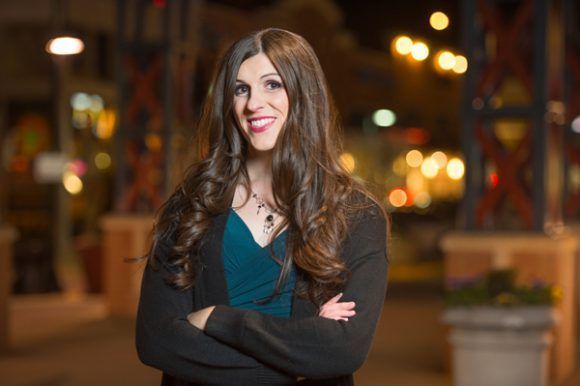
Beyond Just Saying “No”
By David Brooks, US correspondent for Mexico’s LA JORNADA daily
Translated and edited by Walter Lippmann for CubaNews.

Danica Roem became the first trans woman elected to a legislative position in the United States. Photo taken of Rosa Sheep.
Faced with the increasingly obscene and dangerous political landscape in this country, we hear responses that are moving from the simple no to Trump and his agenda, to something that could generate a progressive change in this country.
The most recent state and local elections in various parts of the country held on November 7 were what some expected, wished, prayed for … that is, a first warning of what could be a wave of repudiation and even progressive change through the the polls in the intermediate elections (federal legislative and several governorships) in 2018 and through new, or renewed, decentralized but allied social movements.
Not only did the Democrats sweep away Republicans in states like Virginia, Pennsylvania, New Jersey and others, but many of the electoral winners were not only Democrats but progressives, and in many cases these victories had a tinge of divine vengeance.
For example, Lee Carter, a marine veteran of the Iraq war, who identified himself as a democratic socialist, defeated a Republican to take his place in the lower house of Virginia, and celebrated that night by inviting everyone to sing Solidarity Forever, the hymn of trade union movement.
Also winning a seat in that same chamber wasa Danica Roem, defeating a Republican who had promoted anti-transgender measures and who had declared himself the main anti-homosexual in the state; She is now the first transgender state legislator in the country. Elizabeth Guzman and Hala Ayala became the first Latinas to become state legislators in Virginia’s history.
In Hoboken, New Jersey, the new mayor is Ravinder Bhalla, a Sikh lawyer, who declared: I am everything Trump hates: a dark man in a turban, and a proud American with the knowledge to stop his assault on the values of our country. . In Helena, Montana, the progressive Wilmot Collins is not only the first African-American to be mayor in the history of the state, but is a refugee from Liberia who won against the Republican mayor who opposed to the entry of refugees to this country.
In Philadelphia, perhaps the most radical district attorney in the country, Larry Krasner, civil rights lawyer, fierce critic of the massive incarceration in this country and who has represented Black Lives Matter and Occupy Wall Street activists was elected. In the Atlantic County commissioner race in New Jersey, Ashley Bennett defeated the Republican in that position; She decided to challenge him at the polls after he via Facebook if they would return home in time to cook their. dinners.
Braxton Winston, who won a seat in the city council of Charlotte, North Carolina, is an activist whose image went viral: his fist held high in front of a battalion of riot police before being arrested in a demonstration against the death of an African-American at the hands of police. In Albuquerque, New Mexico, the next mayor will be progressive Tim Keller, who replaces the outgoing conservative Republican.
The progressive triumphs were remarkable, as they offered more evidence of a growing sector within the Democratic Party outside the centrist leadership. Electoral organizations such as the Working Families Party and the Democratic Socialists of America (DSA) together with the growing diaspora of the support movement for the democratic socialist Bernie Sanders (still the most popular national politician in the polls), Our Revolution and new networks as Indivisible, they were key to generating these triumphs.
But it was also the result of new alliances between social groups, especially immigrant organizations that promoted candidates who directly faced the xenophobic policies of pro-Trump Republicans and other civil rights defense organizations such as Black Lives Matter, along with organizations defending the rights of women and environmentalists.
What happened in the November elections with hundreds of progressive local and state candidates is the beginning of a wave (…) a massive repudiation of Donald Trump, said Joe Dinkin of the Working Families Party. Independent experts, such as the influential Cook Political Report, indicate that the polls, for now, indicate that a political wave in favor of the Democrats is being glimpsed in 2018, implying that they could retake control of one, and even both houses of Congress.
The wide range of active resistance against Trump is showing its potential to go beyond being just opposition to the populist and at the same time plutocratic right-wing agenda and pushing forward a progressive agenda both at the polls and in the social sphere, where some claim it is growing a movement of many movements, varied and decentralized, as described by LA Kaufman in The Guardian. He argues that, in addition to established progressive organizations that have seen their membership grow (as in the case of Working Families and DSA), an impressive number of local grassroots groups have flourished -but at the same time, adding to national networks as Indivisible- that as a whole are six times bigger than the Tea Party (the most influential rightwing current within the Republican Party).
And not everything is manifested or has an end in the electoral field, with these movements -inmigrants, indigenous people, anti-war military veterans, defenders of freedoms and civil rights, environmentalists, professional athletes, artists, students, workers’ organizations and trade unions- fighting in several fronts, but with more and more solidarity among them, which makes them very dangerous for the guardians of power.
The “no” that defined the initial resistance to the seizure of power by Trump and his allies is now seeking to invent, to invite, to a yes.
(Taken from La Jornada )

You must be logged in to post a comment.